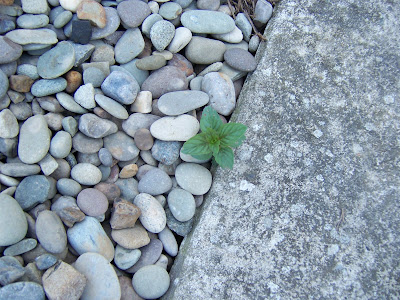 Between a Rock and a Hard Place, September 2007
Between a Rock and a Hard Place, September 2007Somewhere along the line, I developed a literary hierarchy. It looked like this:
Poetry
Fiction
Non-fiction
Magazine Articles
Newspaper Stories
Comic Books and Graphic Novels
Poetry topped the totem pole. Perhaps because it seemed so posh and high falutin' to my young mind, I thought it was the bee's knees of the written word. Maybe that's why I wrote a lot of poetry as a child and teenager. Was I aspiring to greatness? It's possible. But more probable is that adding line breaks and vague metaphors is a great way to jazz up pedestrian prose and purge all of that teenage angst. (My childhood poetry was less angsty and more cutesy. And it may have been better than the adolescent attempts. I was especially pleased when my award-winning "Five Little Flowers" poem made its way into an anthology during the fifth grade.)
I didn't write a lot of fiction. Short stories seemed like too much work, especially next to my admittedly anemic ideas of poetry. All those elements of plot, character, climax, and denouement just seemed like too much to dream up and keep organized. I internalized the idea that I wasn't a good enough writer, or creative enough person, to write short stories. And a novel? Surely you jest.
I submitted my angsty poems with my application to The Pennsylvania Governor's School for the Arts. I was rejected two years in a row, but my second attempt did get me a spot in the two-week-long, runner-up SHARE program (Summer Honors Arts Resident Experience). While there, I tentatively branched out into short stories. My group was given the word "heat" as a writing prompt. I wrote a short story about a homeless woman who had to warm herself in front of barrels of fire. Her luck finally turned and she got her own apartment -- which then burned to the ground.
While I usually steered clear of writing fiction, I read a lot of it. And I considered it to be superior to non-fiction. Even as recently as my 20's, I secretly scoffed at people who preferred to read non-fiction. I thought their minds and imaginations were inferior to those of us who had Literature Degrees. La-dee-da! Ironically, I considered fiction to be the "real stories." I wasn't interested in memoirs, most magazine or newspaper articles, or anything dealing with historical or actual events. And essays? I didn't know that was even a legitimate term. Who reads essays besides high school English teachers?
But oh how I love David Sedaris and Sarah Vowell -- both in print and on the radio. Give me an hour to listen to "This American Life" and I'm a happy camper. I dug Bill Bryson's witty insights after living in England for a year. One of the seminal influences of my adolescence was Robert Fulghum, author of All I Really Need to Know I Learned in Kindergarten and It Was on Fire When I Lay Down on It. I even crafted my high school graduation speech around one of Fulghum's essays called "Giants, Wizards, and Dwarfs." When I extolled the virtues of being an individual and asked, "Where do the mermaids stand?", I think I brought my French teacher to tears.
In my college creative writing class, the pieces I most liked writing -- and the ones that came easiest to me -- fell into the category of narrative essay. I loved capturing real people as characters, relaying tales of the real-life wackiness and poignant moments that surrounded me. There was my roommate who turned out to have schizophrenia; the time my teenage brother lectured me for using the word "shit" and told me -- an English major! -- that only people with limited vocabularies use swear words; and the moody nighttime walks I took with the brooding, clove-smoking actor I never ended up dating.
A few years ago I discovered the term "creative nonfiction" and things began to click. It was slowly dawning on me that my true passion for writing is non-fiction. I love the personal essay and was thrilled to find out that this was a valid form of expression. I never thought of myself as a journalist until I realized that I could tell real stories as stories: facts embedded within a narrative arc. The idea of "narrative journalism" moved journalism way up the totem pole for me.
Actually, I have to admit that my nice little construct has fallen apart. Poetry no longer seems better than journalism. Non-fiction is no longer sub-par to fiction. It took me a long time to uncover my writing strengths and passions. It's one of those obvious epiphanies that had me smacking my forward to say "Eureka!" and shaking my head to say "Duh!" all at the same time.
An interesting thing has happened now that I've embraced the non-fiction oeuvre: I want to write a novel.
For years I've thought about writing a novel. Mostly, I've thought that there was no way I'd ever write one. If short stories seemed fraught with dangerous elements like plot and character development, a novel was just out of the question. I mean, how on earth would I make up all that stuff?
I've read about novelists who say that their characters take on lives of their own, directing the plot with their actions. These writers say they often sit back and let the story go where the story must. I've long envied those writers. And never, ever thought I could be one of them.
Then I heard about NaNoWriMo: National Novel Writing Month. One 50,000 word novel in 30 days. Sound insane? Yes. And I think I'm going to do it. The sheer lunacy of cramming that much fiction into one month means that my standards will have to go way down. The inner critic who would normally make me slave over a paragraph will just have to take a leave of absence while I bang out a shitty first draft.
That's the whole thrust of NaNoWriMo: To aim for quantity, not quality. And by so doing, to achieve something that might otherwise feel beyond our capabilities.
I have no plot. But according to Chris Baty, the founder of NaNoWriMo, that's fine. I'm about one-quarter of the way through his book, No Plot? No Problem!. So far it hasn't helped me to overcome the no plot problem, but I'm hopeful. The novel writing experience starts on November 1, so I don't have that long to worry about it.
There's a small chance that I'll chicken out, but I think I owe it to myself to join the tens of thousands of others around the world who will be trying to write an average of 1,666.66 words each day. (Hm, that's rather an evil looking number...)
By announcing my intention here, I'm hoping some of my readers will offer their support and encouragement or even decide to join in and write their own slapdash novel next month. Oh, and I'm also open to plot or character suggestions. If you happen to have some lying about that you aren't going to use, please send them my way. Maybe they'll take on a life of their own and end up in my pages.
 Thursday, February 21, 2008 at 11:48PM
Thursday, February 21, 2008 at 11:48PM  beautiful things,
beautiful things,  community,
community,  inspiration,
inspiration,  literature,
literature,  love
love 



